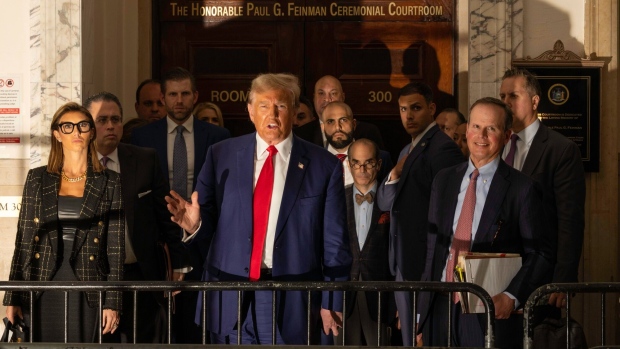Feb 28, 2024
Trump Offering $100 Million Bond to Appeal NY Fraud Verdict
, Bloomberg News

(Bloomberg) -- A New York appeals court denied Donald Trump’s request to temporarily delay payment of the state’s $454 million verdict against him, even after the former president said he may be forced to sell properties to cover the judgment.
A judge on Wednesday rejected Trump’s offer to instead post a $100 million bond backed by some of his biggest assets while he appeals. That means Trump may soon have to post a bond of at least 110% of the judgment to keep it on hold while he appeals.
But the decision was mixed. Trump won a temporary delay to other aspects of the Feb. 16 verdict by Justice Arthur Engoron, including a three-year ban on the former president seeking loans from New York chartered banks or serving as an officer or director of any company based in the state.
The ruling is only valid until a full appellate panel hears Trump’s request for a delay that would last for his entire appeal.
An earlier filing by Trump, where he argued to put the penalty on hold, indicated for the first time that he may not have enough cash to cover the verdict or post a full bond. Trump also owes $83.3 million to writer E. Jean Carroll after he lost a defamation suit last month, creating a major cash crunch as Trump campaigns to return to the White House in the November election.
“In the absence of a stay on the terms herein outlined, properties would likely need to be sold to raise capital under exigent circumstances, and there would be no way to recover any property sold following a successful appeal and no means to recover the resulting financial losses,” Trump’s lawyers said in an appeals court filing.
Trump’s lawyers had called the fine “unprecedented and unconstitutional” in a filing with the court before the hearing. Trump said in the filing that he was prepared to secure his proposed $100 million bond with properties including his 40 Wall Street skyscraper and Trump National Golf Club and Trump Park Avenue.
Read More: Trump’s $540 Million Court Loss Tests His ‘King of Debt’ Claim
New York Attorney General Letitia James had objected to Trump’s motion. She argued that granting a temporary delay for Trump and his co-defendants in the case would raise the risk he wouldn’t pay what he owes, even if he loses the appeal.
“There is no merit to defendants’ contention that a full bond or deposit is unnecessary because they are willing to post a partial undertaking of less than a quarter of the judgment amount,” the attorney general’s office wrote in a letter to the court. “Defendants all but concede Mr. Trump has insufficient liquid assets to satisfy the judgment; defendants would need ‘to raise capital’ to do so.”
“These are precisely the circumstances for which a full bond or deposit is necessary,” the state added.
The verdict by Engron found Trump inflated the value of his assets by billions of dollars a year for more than a decade to get better terms on loans, reaping hundreds of millions of dollars in “illegal profit.” The judge ordered Trump to pay a $355 million fine plus $99 million in pre-trial interest.
Engoron also barred Trump and his company from seeking loans for several years from any New York-chartered banks, which the former president claims further hobbles his effort to get a bond.
“The exorbitant and punitive amount of the judgment coupled with an unlawful and unconstitutional blanket prohibition on lending transactions would make it impossible to secure and post a complete bond,” Trump’s lawyers said. They added that enforcing the verdict would result in “needless, irreparable injury.”
For every day he doesn’t pay, Trump said he’s facing $115,000 in accrued interest on the judgment, which is “beyond any permissible or constitutional scope of disgorgement.”
There is precedent for Trump winning an emergency request before a single appeals court judge. The former president was able to halt the fines and a gag order Engoron imposed in October during the trial, though that decision was reversed later by the full panel of appellate court judges. In September when Engoron ordered the dissolution of Trump’s business licenses, a single appellate judge granted Trump’s emergency request.
(Updates with detail from court filings.)
©2024 Bloomberg L.P.








